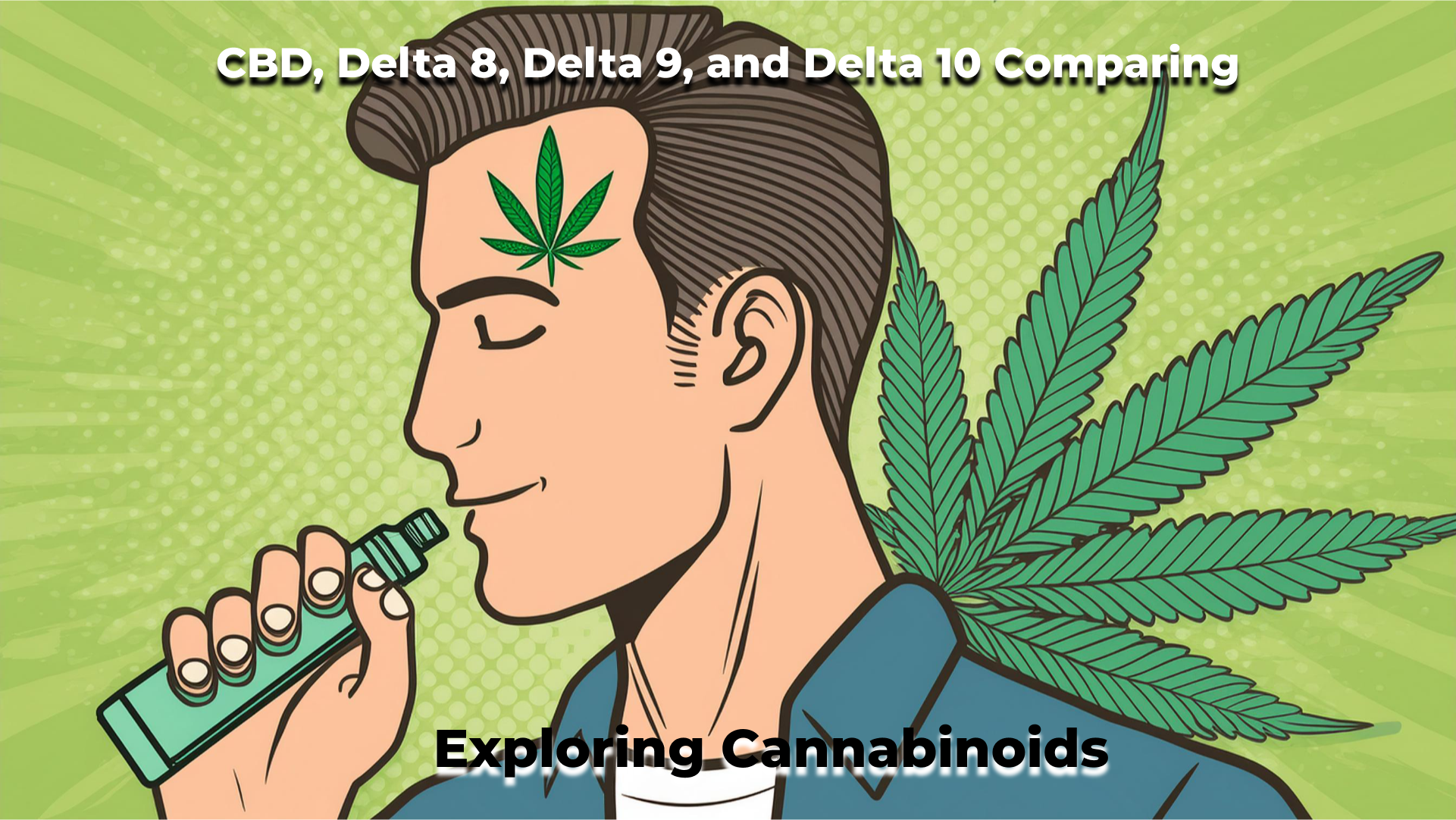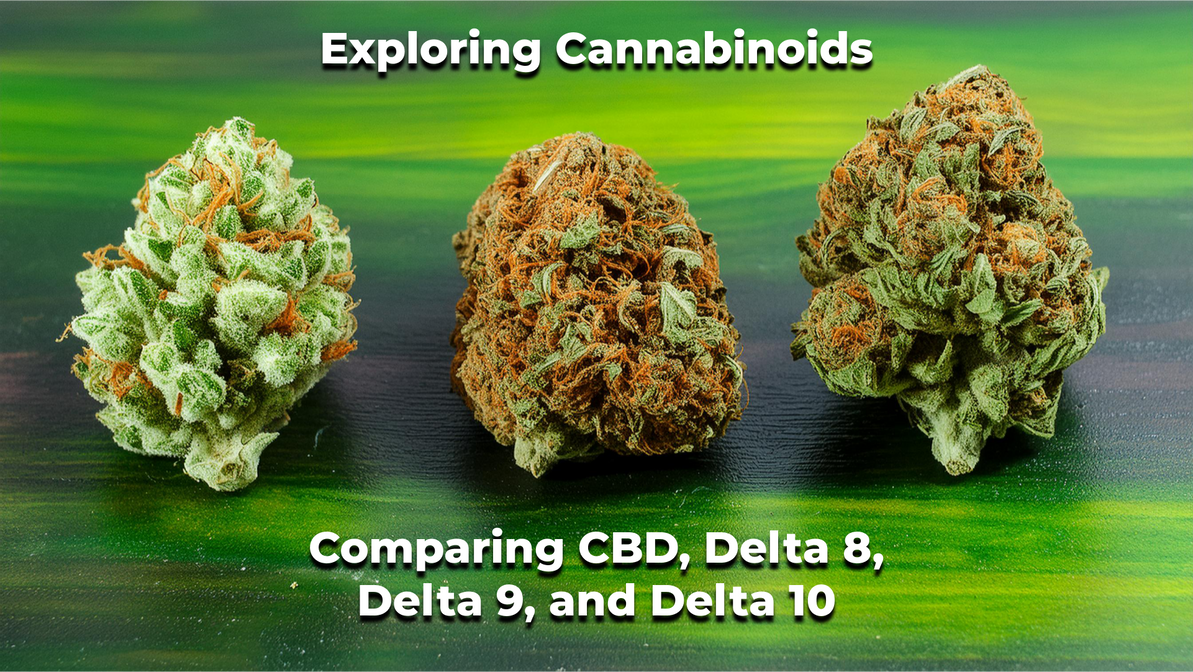Exploring Cannabinoids: Comparing CBD, Delta 8, Delta 9, and Delta 10
Explore the differences and benefits of cannabinoids like CBD, Delta 8, Delta 9, and Delta 10. Learn about their effects on pain relief, anxiety, sleep, and more in our comprehensive guide.Cannabinoids such as CBD (Cannabidiol), Delta 8, Delta 9, and Delta 10 naturally occur in the cannabis plant. They interact with the body's endocannabinoid system by binding to CB1 and CB2 receptors, each influencing the system differently based on the strength of their bonding and receptor affinity. These cannabinoids vary in their effects, yet share several beneficial properties.
CBD: A Non-Intoxicating Option for Wellness
CBD is renowned for its non-psychoactive effects, making it a popular choice for those seeking therapeutic benefits without euphoria. Found in up to 40% of the cannabis plant's extract, CBD has been extensively studied and is used in various forms like oils, capsules, and even smokable flower. It is particularly effective in binding with CB2 receptors, offering relief from anxiety, pain, and inflammation without intoxicating effects.
Key Benefits of CBD:
- Epilepsy Treatment: FDA-approved Epidiolex for treating specific seizure disorders.
- Pain Management: Shown to reduce neuropathic pain significantly.
- Anti-Inflammatory: Effective in reducing joint and muscle inflammation.
- Sleep Enhancement: Helps improve sleep quality and duration.
Delta 8: The Gentle Psychoactive
Delta 8, a milder psychoactive cannabinoid, is synthesized from CBD due to its trace natural occurrence. It provides a clear-headed, euphoric experience that enhances energy and creativity, often described as less intense than its counterparts Delta 9 and Delta 10.
Key Benefits of Delta 8:
- Pain Reduction: Helps alleviate corneal pain and inflammation.
- Anxiety Relief: Widely used to combat anxiety and stress.
- Anti-Nausea: Proven effective in preventing nausea in cancer patients post-treatment.
Delta 9: The Strong Classic
Delta 9 is the most well-known psychoactive cannabinoid, offering profound euphoria and relaxation. It binds efficiently with CB1 receptors, creating intense psychoactive effects celebrated by many for its deep relaxation properties.
Key Benefits of Delta 9:
- Mood Enhancement: Uplifts mood and reduces stress.
- Nausea Control: Effective anti-nausea properties across numerous studies.
- Pain Relief: Commonly used for chronic pain relief.
- Improved Sleep: Helps users achieve better sleep.
Delta 10: A Balanced Psychoactive Experience
Delta 10 offers a mild, energizing euphoria with less intensity than Delta 9 but more so than Delta 8. Like its relatives, it binds to both CB1 and CB2 receptors, providing a balanced psychoactive effect along with various therapeutic benefits.
Key Benefits of Delta 10:
- Stress Reduction: Known to uplift mood and alleviate stress.
- Chronic Pain Relief: Used to manage chronic pain effectively.
- Anti-Inflammatory: Shows potential in fighting inflammation.

Legality and Availability
Following the 2018 Farm Bill, CBD, Delta 8, and Delta 10 are federally legal, whereas Delta 9 is legal only if the product contains less than 0.3% THC on a dry weight basis. However, state regulations vary, so it's crucial to verify local laws regarding cannabinoid use.
Conclusion
While CBD, Delta 8, Delta 9, and Delta 10 share similar therapeutic effects, they differ significantly in their psychoactive intensities. Understanding these differences can help consumers choose the cannabinoid that best suits their needs, whether for relaxation, pain relief, or mood enhancement.
Recent Posts
-
The Connection Between Delta 8 THC and Increased Creativity
The Connection Between Delta 8 THC and Increased CreativityIf you …Jul 10th 2025 -
Interviews with Experts: What’s Next for Delta 8 THC?
Interviews with Experts: What’s Next for Delta 8 THC?As the lands …Jul 9th 2025 -
Sustainability Matters: Where Our Hemp Comes From
At Windy CBD, we pride ourselves not only on offering premium Delt …Jul 8th 2025

